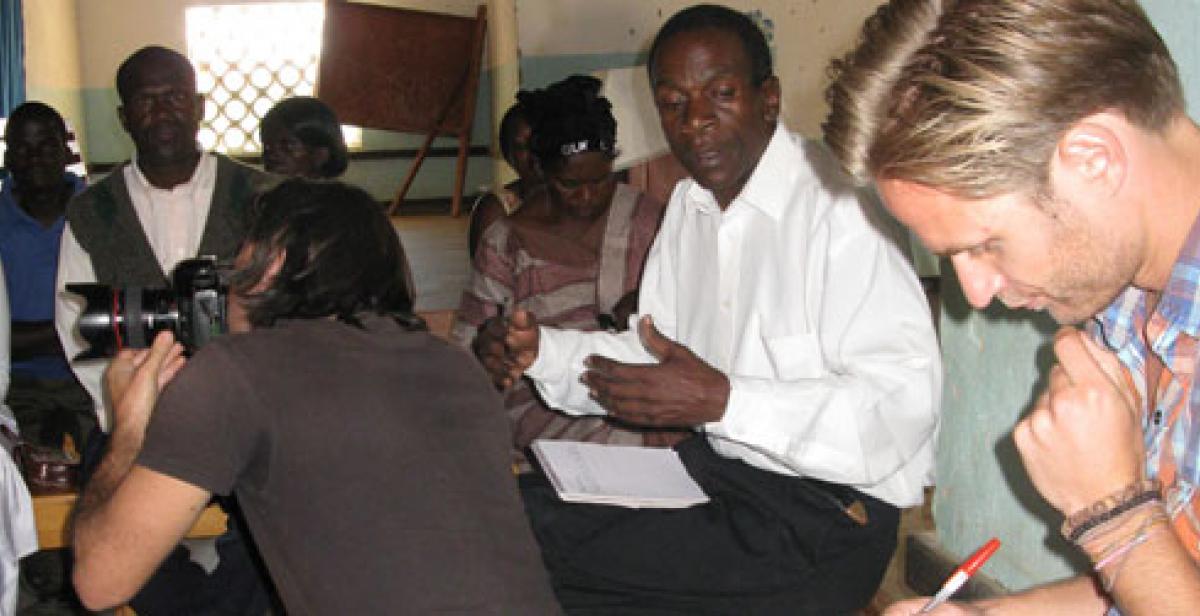I’ve spent the past week in Malawi accompanying Rob Trask (pictured above right), finalist in the Guardian International Development Journalism Competition, as he writes about the role of faith in responding to HIV. In addition to being my first time in the country, it has also been my inaugural visit to Progressio’s partner projects, and frankly, both have blown me away.
Malawians use the universal greeting ‘you are very welcome’, but say it with uncommon warmth, affection and appreciation for your visit. This was never starker then the morning when we visited a community support group near Mzuzu, who are linked with Progressio partner organisation UNGWERA (meaning light). The group of women, all living with HIV, welcomed us into their village with singing, dancing, clapping and beaming smiles. Whilst their daily lives are characterised by hardship, their positivity, strength and dignity left just as an indelible impression.
Rob is writing about what we got up to for his assignment so I’ll leave it to him to report on the incredible work being done by Progressio partners, NGOs and CBOs (Community Based Organisations), some faith leaders and by the communities themselves.
However, in addition to the impact of HIV on the development of Malawi, we’ve witnessed many of the other challenges currently facing the country and its population.
Economic crisis
Strikes are a daily occurrence in Malawi. The devaluation of the kwacha by 49% combined with inflation of 12% is adding to the daily struggle for many to afford the basics. Day after day brings the announcement of another strike in protest at the cut in the value of salaries, and the government must negotiate, with few resources at their disposal, to reach a compromise. Fuel shortages lead to panic buying until the pumps ran dry.
Fragility of the new government
President Joyce Banda, widely praised in the international press, has her work cut out. Pick up the newspaper and you will see someone calling for her resignation. Many, we heard, see her as a member of the old regime; others see her problems as inherited. The government’s pledge to turn the economy around within the first 18 months is a tall order and one to which she is being held to account every day. For most people, change was needed yesterday and progress will clearly take a long time to reach rural communities.
Foreign investment
I’d heard much of foreign, in particular Chinese, investment in Malawi – a ‘hot topic’ trend across much of Africa. Indeed we saw the Parliament Building and the five star hotel built by Chinese workers with Chinese machinery. This has led to much resentment, as there is such a wealth of local labour. President Banda has started to turn to the tide on foreign traders who are not investing in the Malawi economy and are pricing small-scale businesses out of the market.
I was interested to note that every time we entered a new town a huge billboard courtesy of G4S welcomed us. The British based company provides the majority of security services in Malawi and thus is a significant source of employment.
Deforestation
Dominant in my mind as I leave Malawi is the blight of deforestation on an otherwise breathtaking landscape. I had read that Malawi loses nearly 200 square miles of its forests annually, a deforestation rate of 2.8%. I can’t help but feel that this situation is a national tragedy. On the drive between Lilongwe and Mzuzu and Mzimba we could see hill after hill shaved of its leafy canopy. Demand for wood and charcoal, the preferred cooking and heating fuels in Malawi, in addition to the high demand for bricks, is driving deforestation. Yet logging provides much needed income.
As I heard from Progressio partner, Environment Africa, logging dries up streams, pollutes the air, lowers the water table, erodes the soil and silts rivers. Afforestation programmes, like those supported by Environment Africa, are in short supply. Most alarming of all is the thought that deforestation will not stop until the supply does.
Natural resource management
Much more broadly, the conservation and sustainable management of Malawi’s natural resources presents major challenges. As Progressio development worker Mercy Chimpokosera explained to me, there is a mindset that natural resources such as land, water and forests are infinite in supply and will naturally regenerate.
Of course, access to water, fuel and nutritious food becomes even more critical when living with HIV. Each of the programmes that we visited talked about natural resource management in tandem with supporting those living with and affected by the virus.
Climate change
It was encouraging to hear that the government is acutely aware of the problems posed by climate change and the impact that this is having on day-to-day life, especially for the poorest and most marginalised. Despite the economic crisis, climate change is a government priority (if only this were the case for all governments). As water scarcity increases, crops and livestock are at risk, yet the government has vowed to climate-proof agriculture – the government is acutely aware that failing to do so will only exacerbate current problems.
Whilst the problems are many, this week has introduced me to the resilience and determination of many people in Malawi. I’ve seen the reality of Malawi’s ranking near the bottom of the Human Development Index but have also had the privilege of seeing the inspirational work being done to overcome this.
Lis Martin is Progressio's Environment Policy and Advocacy Officer.
Photo: Rob Trask (right) and photographer Siegfried Modola meeting an HIV community support group in Mzuzu.



